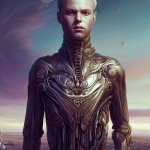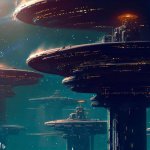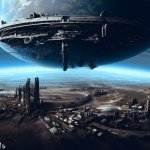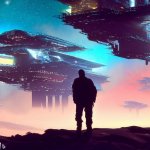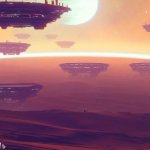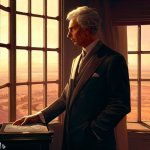I started over, and directed each page's content. I also made some modifications of my own into it, and polished it up:
Prologue
As the sun dipped below the horizon, casting a warm orange glow on the beleaguered city below, it was hard to imagine that the world was falling apart. Yet, just beneath the surface, the signs were there: the collapsing infrastructure, the hopeless expressions of its inhabitants, and the ever-present hum of desperation that seemed to permeate the very air they breathed.
In the late 21st century, Earth had succumbed to the perils of climate change, overpopulation, and social unrest. Sea levels had risen, swallowing coastal cities whole, while the remaining land was battered by violent storms and crippling droughts. Food and water had become scarce, leading to widespread famine and an ever-growing number of climate refugees.
The tension in the air was palpable as political strife mounted, with leaders around the globe either grappling for power or failing to maintain order. Nations and ideologies clashed with increasing fervor, and the world teetered on the brink of catastrophe. Amidst the chaos, the gap between the rich and the poor grew to an alarming extent, with the wealthy and powerful tightening their grip on resources, further exacerbating the situation for those less fortunate.
This dire state of affairs seemed to spiral out of control with each passing day, and as the situation on Earth grew increasingly unsustainable, the elite scrambled to find a solution. It was not out of concern for the masses or a sense of responsibility that they sought to remedy the world's woes, but rather an insatiable desire to preserve their wealth, power, and status at any cost.
The urgency of their plight fueled their ambition, pushing them to explore new possibilities and ventures that would ensure their continued survival in a world that was quite literally falling apart around them. And so, with one eye on the tumultuous planet below and the other gazing at the stars, they began to dream of a new world – a refuge far removed from the devastation that ravaged their once-pristine home.
Unbeknownst to the common people, a plan was already in motion – a plan that would forever change the trajectory of humankind, and irrevocably cleave the world in two. The Great Divide was upon them, and there was no turning back.
The architects of the escape plan were a cunning, powerful conglomerate: corporations, captains of industry, and political heavyweights who had managed to secure their positions at the pinnacle of society. They were the proverbial puppet masters, capable of pulling the strings to sway public opinion and amass fortunes beyond the wildest dreams of ordinary people.
The corporations played a pivotal role in the grand scheme, leveraging their vast resources and technological prowess to lay the groundwork for the impending exodus. Tech giants led the charge, investing heavily in research and development to create cutting-edge advancements in space travel, habitation, and sustainability. Aerospace companies, sensing opportunity in the chaos, diverted their resources from traditional projects to focus on the construction of the luxurious space platforms that would one day serve as their new homes.
The captains of industry, those who had built their empires through relentless determination and sheer force of will, were equally crucial in the plan's execution. They formed secret alliances and brokered deals, trading favors and influence to ensure that they would have a seat at the table when the time came. Their vast wealth provided the fuel that would drive humanity's escape from Earth, turning the impossible dream of the colonies into a reality.
To achieve their goal, these powerful individuals needed to navigate a world fraught with danger and uncertainty, all while keeping their grand ambitions hidden from the masses. They operated in the shadows, manipulating governments, media outlets, and even rival corporations to further their agenda, all the while maintaining a façade of altruism and concern for the plight of their fellow humans.
But the elite knew that secrecy alone would not be enough. They understood that their lofty ambitions could only be realized if they were able to gain the support of the public – or, at the very least, prevent outright opposition. To this end, they orchestrated an elaborate campaign of misinformation and manipulation, convincing the masses that their efforts were solely focused on saving the planet, rather than abandoning it.
In truth, their motivations were purely selfish: the promise of a haven amongst the stars, a sanctuary far removed from the chaos and destruction that plagued the Earth. To realize their vision, they would stop at nothing, employing every resource at their disposal and ruthlessly eliminating any obstacles that stood in their path.
With each passing day, the plans for the exodus grew more complex, and the powerful few grew more confident in their ability to leave the turmoil of Earth behind. Little did they know that their actions would have far-reaching consequences, igniting a series of events that would forever alter the course of human history. The dawn of the Great Divide was fast approaching, and nothing would ever be the same again.
As the plans for the exodus took shape, the powerful elite began to divide along ethno-nationalist lines. While some saw the space platforms as a chance to create a utopian society that transcended the divisions that had plagued Earth for centuries, others saw an opportunity to build a future that preserved their cultural identity and traditions, free from the influence of outsiders.
The ethno-nationalist colonies were a manifestation of centuries-old tensions and rivalries, with the elites from various nations seeking to establish self-contained sanctuaries in space. They envisioned a future where they could maintain their customs and way of life, insulated from the chaos and dilution that they believed had weakened the fabric of their society on Earth. With vast resources at their disposal, these elites financed the construction of orbital platforms tailored to their cultural preferences, each a reflection of the nation they sought to recreate.
On the other hand, the multi-racial and multi-ethnic colonies were founded on the principles of unity, cooperation, and inclusivity. The leaders of these colonies believed that the key to humanity's survival lay not in division, but in the pooling of resources, knowledge, and expertise. They sought to create a society where individuals from different backgrounds could live and work together, forging a new future that transcended the barriers of race, nationality, and culture. These colonies were characterized by their diversity and progressive values, a stark contrast to their ethno-nationalist counterparts.
The construction of these colonies further drove a wedge between the elite, as they sought alliances based on shared values and ambitions. Some chose to form pacts with like-minded individuals, ensuring that their new societies would reflect their ideals and aspirations. Others, driven by pragmatism, sought to forge alliances that maximized their influence and control, forming uneasy partnerships that spanned the ideological divide.
As the final preparations for the Great Divide neared completion, the inhabitants of Earth remained largely unaware of the true nature of the looming exodus. The elites continued their dance of deception, veiling their intentions behind a smokescreen of altruism and concern for the greater good. But as the time to depart drew closer, the cracks in the façade began to show, and the truth of the matter could not be hidden forever. The day of reckoning was fast approaching, and with it, the birth of a new era for humanity.
As the elite prepared for their journey into the cosmos, it became evident that, despite their diversity, certain groups were disproportionately represented among them. While the powerful few hailed from virtually every corner of the globe, Europeans, East Asians, and Jewish magnates, along with Middle Eastern oil tycoons, made up a significant portion of the ruling classes that endeavored to charter voyages.
These elites, driven by their desire to preserve their own culture and traditions, established ethno-nationalist colonies and space platforms that catered specifically to their respective groups. Their grand visions were carefully crafted to reflect the unique identities and aspirations of their constituents, further reinforcing the deep divisions among the elite themselves.
Meanwhile, the majority of Earth's population comprised people of African, South Asian, and Latin American descent, who continued to suffer from the lasting effects of poverty. Many of them lived in poverty and faced a daily struggle for survival amidst the escalating chaos on Earth. This vast disparity in wealth and opportunity painted a stark portrait of the societal divisions that persisted even in the face of global catastrophe.
By the time period in which this story takes place, the world's demographic landscape had shifted dramatically. Climate change, overpopulation, and social unrest had taken a particularly heavy toll on vulnerable communities in developing nations, leading to unprecedented levels of displacement and migration. As a result, the global distribution of wealth and power became even more skewed, with resources increasingly concentrated in the hands of the privileged few.
Far from being as prevalent as their counter parts, a select group of wealthy Black and Brown individuals, who had managed to ascend to positions of power and influence, emerged as key players in the space colonization efforts of their respective groups. Fueled by a desire to create a future where their communities could prosper and flourish, these visionaries set out to establish their own space platforms, exclusive to their ethnicities. These new colonies were designed to serve as ethno-nationalist havens for their people, providing them with an opportunity to escape the strife and turmoil that had engulfed their home planet.
As the elite prepared to embark on their cosmic journey, the Earth's inhabitants, now facing an even more fractured and divided future, began to grapple with the implications of the Great Divide. The stark inequality and abandonment by their leaders served as a bitter reminder of the injustices they had endured for centuries. In the face of such adversity, the underclasses would rise up, determined to forge their own destiny and reclaim the world that had been lost from them.
In the years that followed the Great Divide, Earth was battered by a relentless series of natural disasters and pandemics, compounding the already catastrophic effects of climate change, overpopulation, and social unrest. The beleaguered planet faced one calamity after another: powerful hurricanes ravaged the coasts, tsunamis wiped out entire cities, and earthquakes shook the very foundations of civilization. Vast tracts of land were rendered uninhabitable due to severe droughts, while other regions were inundated by torrential rains and flooding.
As if these disasters were not enough, the people of Earth also had to contend with a series of pandemics. Deadly diseases emerged, rapidly spreading through the weakened and malnourished population. Health systems crumbled under the strain, leaving the survivors at the mercy of the relentless onslaught of pathogens.
By the year 2125, in the 22nd century, the global population had plummeted dramatically as a result of the unprecedented scale of death and destruction. Once teeming with billions of inhabitants, the Earth now struggled to support a dwindling population of fewer than two billion souls.
In the face of such immense challenges, the world's original governments began to collapse, unable to maintain even the semblance of order amidst the chaos. Those that managed to cling to power were shadows of their former selves, their authority eroded and their structures rife with corruption. The ideals and principles upon which they had been founded were long forgotten, replaced by a brutal, unrelenting struggle for survival.
As the remnants of the old world crumbled away, new nations began to emerge from the ashes. Lacking the skilled individuals and knowledge base required to rebuild, these fledgling states reverted to a pre-industrialized existence. The citizens of these new nations eked out a living amongst the ruins of a once-great civilization, struggling to survive amidst the decaying remnants of a forgotten age.
The passage of time only served to further distance the people of Earth from the advanced technologies and achievements of their predecessors. The remnants of the past, now inscrutable and enigmatic, became the subject of wild speculation and far-fetched theories. The true history of the world was lost, buried beneath layers of myth and legend, as humanity struggled to make sense of the shattered remains of a bygone era.
With the world plunged into a dark age, the surviving population faced a bleak and uncertain future. The lessons of the past had been forgotten, and the Earth had become a desolate, unforgiving place where only the strong and resourceful could hope to endure. Yet, despite the adversity they faced, the indomitable spirit of humanity refused to be extinguished. Forged in the fires of hardship and loss, a new generation arose, determined to reclaim the world that had been lost and forge a new path forward for the people of Earth."


